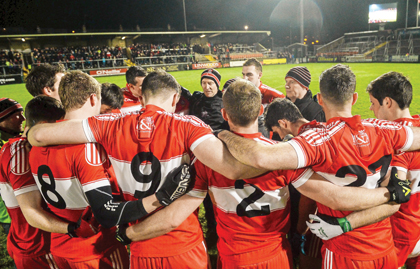
A manager must lead by example
English Premiership managers always appear to be under threat of the sack.
Ulster Rugby recently altered their management structure and three Ulster counties also changed their mangers in Gaelic football recently.
This is the time of the year when there is a virtual ‘merry-go-round’ in the realm of GAA managers across Ulster.
It is said that managers have only two functions:
(i) to get the job done and (ii) to develop people/players. Often, however, managers are too busy doing the first to get around to the second.
Managing by example
A manager must establish the right kind of relationship with his team the moment he meets them. Think Wooden, Ferguson, Harte, Cody, Kernan.
His behaviour will be taken by the team as the model for their behaviour. They will tend to emulate him, initially for approval and inclusion into the team.
A manager’s mood is reflected in his players.
If the team leader wants to establish openness and honesty in the team, he needs to be ‘open’ and ‘honest’ from the start. The same applies to establishing trust among the team. From day one, the manager should make the team aware of his intended management style and allow questions about it.
If the manager pays only lip service to team building principles, he will get no more than he pays for. Consider the following options that many managers have done with their team in the past and determine which you might use in your role as team manager.
1. Discuss and agree the definition of a set of common goals for the team
This should be done within the team regardless of whether the organisation, association or club has defined the team’s goal. Each team member should be asked to contribute and also to add personal goals that might be embraced within the overall team goal.
2. Develop a set of ground rules/operating principles acceptable to all team members and to which all have contributed
All should agree to abide by these even if they are not fully behind every one them. If they want their wishes included, they must agree to respect those of others. These ground rules need regular checking to see if being adhered to or need changing or updating. If lapses by some are frequent, stern action should be taken, eg, re attendance, punctuality, etc.
3. Set aside time regularly, usually in conjunction with a scheduled team meeting for group process work
Here ground rules are reviewed, allowing appreciations and concerns (grips), both to be expressed. Use the ‘Heart Talk’ approach when one player expresses his views while holding a ball. The ball is passed around ‘1 by 1’ until everyone has had their say without interruption or interrogation afterwards. Management then, through time, deal with ideas/issues raised.
4. Hold discussions on the meaning and purpose of the team
Best perhaps to do this on a scheduled one-to-one basis, say at start/middle/end of season to make everyone aware of why, when, where and and what the team is going/doing and who is taking the team there. Three simple questions can attend to this need, eg, (i) As a player, where do you see yourself now and where is the team? (ii) As a player where do you want to go and where the team should go this year, eg, bed down a place/win the championship or reach what stage? (iii) What do you need from management to help you and the team get there?
5. Canvas team members’ views about the desirability of arranging structured social time together
Day away, quiz, meal together, etc. These events can create greater appreciaiton of each other. If one or more are unable to commit regularly then a feeling of separateness can creep in which can affect team morale and oneness. So, be careful.
6. Develop a team interest outside the squad’s competition preparation time
Learn a new language together, take up a collective hobby, eg, yoga, ballroom dancing, table tennis. Alternatively they, as a team, get involved in some charity work, eg, ‘adopt a child’ in developing country. These activities breed a greater sense of contribution and belonging to the players’ overall life, eg, ‘Campa Cormac’ and ‘Michaela Foundation’ involvement.
7. Put support systems in place to deal, in strict confidence, with individual troubles or concerns as they arise
Create a ‘buddy’ system where each player has one person delegated that they can talk to or delegate qualified back-room staff to be a buddy. Pre-training on a whiteboard, each player on a scale of ‘1 to 10’ logs their level of well being feeling at that time. Those writing ‘3 or less’ should be seen by a qualified back-room staff member before the session. A troubled and distracted mind can lead to injury on the training field.
8. Practice team qualities together
If players are doing extra preparatory work, encourage them to do it in groups. They are more likely to sustain the effort in groups than individually and working together builds trust, openness and understanding.
If you do use any of these options or options of your own, remember that the basis of managing/coaching to improve team performance is not imposing but increasing individual and collective awareness and responsibility.
So, manage by example.
Receive quality journalism wherever you are, on any device. Keep up to date from the comfort of your own home with a digital subscription.
Any time | Any place | Anywhere











